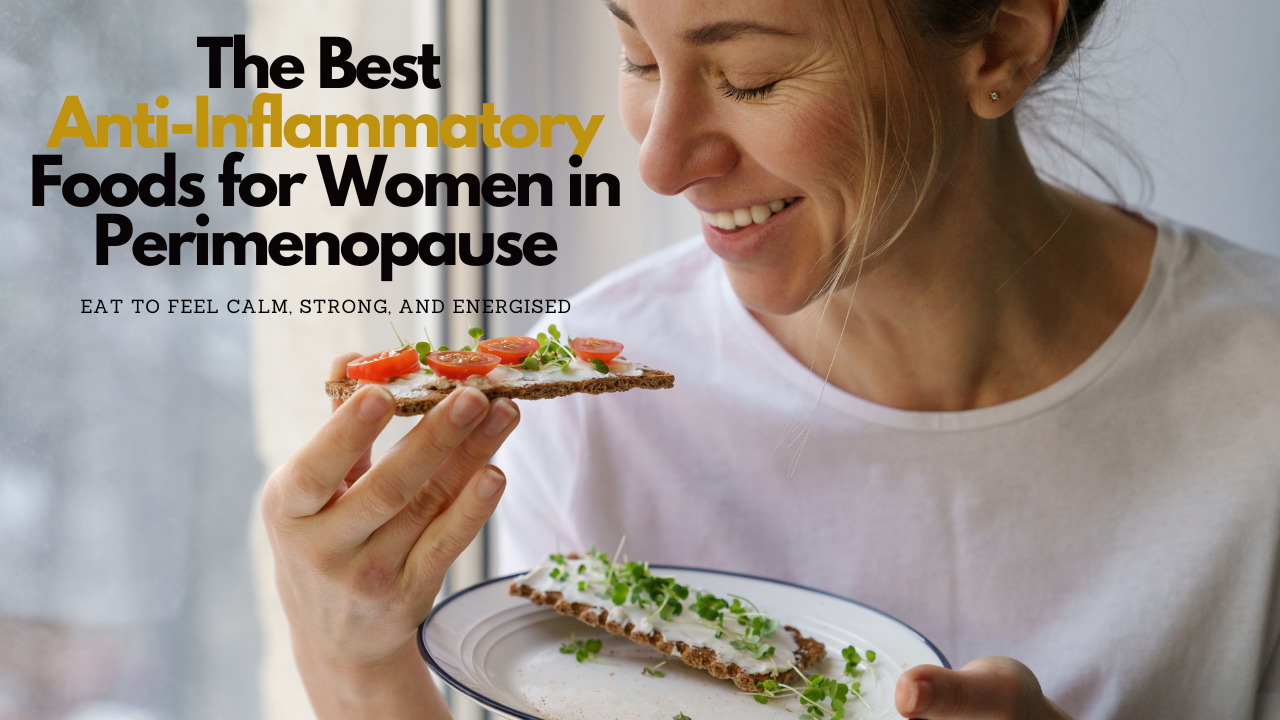The Best Anti-Inflammatory Foods for Women in Perimenopause: Eat to Feel Calm, Strong, and Energised
Oct 06, 2025
If you’ve noticed that your body feels a little more “puffy,” “sluggish,” or “off” lately, you’re not imagining it.
During perimenopause, inflammation tends to rise thanks to hormonal changes, stress, and shifts in metabolism.
The good news? What you eat can make a massive difference.
Certain foods actually help calm the body’s internal “fire,” supporting hormone balance, joint health, mood, and even weight management.
Let’s break down what’s really going on inside your body and the best anti-inflammatory foods to help you feel vibrant, clear-headed, and strong again.
Why Inflammation Increases in Perimenopause
As estrogen levels start to fluctuate and eventually decline, your body becomes more sensitive to inflammation. Estrogen actually has a protective, anti-inflammatory effect so when it dips, you might notice new aches, fatigue, or bloating creeping in.
Other common culprits add fuel to the fire:
-
Poor sleep (thanks, night sweats)
-
Stress and elevated cortisol
-
Processed foods and sugar
-
Lack of movement
The goal isn’t to eliminate inflammation entirely it’s part of your body’s natural defense system.
But when it becomes chronic, it can lead to issues like joint pain, brain fog, and increased belly fat.
That’s where smart food choices come in.
Top Anti-Inflammatory Foods for Perimenopausal Women
1. Fatty Fish (Salmon, Sardines, Mackerel, Trout)
These are loaded with omega-3 fatty acids natural inflammation fighters that support your joints, heart, and brain.
Studies show omega-3s can reduce hot flashes and improve mood, too.
Try this: Aim for two servings a week. Grill salmon with lemon and olive oil, or add canned sardines to a salad for an easy protein boost.
2. Leafy Greens (Spinach, Kale, Swiss Chard, Rocket)
Greens are rich in antioxidants like vitamin C and polyphenols, which help neutralize inflammation-causing free radicals.
Try this: Add a handful of greens to your morning smoothie or toss them into soups and omelets. Every serving adds up!
3. Berries (Blueberries, Strawberries, Raspberries)
These little powerhouses are bursting with anthocyanins compounds proven to reduce oxidative stress and improve blood vessel health.
Try this: Keep frozen berries on hand for easy smoothie bowls or a sweet, healthy dessert.
4. Extra Virgin Olive Oil
Olive oil contains oleocanthal, a compound shown to work similarly to anti-inflammatory medications (without the side effects).
Try this: Drizzle it on roasted veggies or use it as your go-to cooking oil instead of seed oils.
5. Turmeric (and Black Pepper)
Turmeric’s active compound, curcumin, is one of the most studied anti-inflammatory agents in the world. Black pepper enhances its absorption so they’re best paired together.
Try this: Add a teaspoon of turmeric and a pinch of black pepper to scrambled eggs, soups, or warm milk for a soothing “golden latte.”
6. Avocados
Packed with healthy fats, potassium, and antioxidants, avocados support hormone production and fight inflammation at a cellular level.
Try this: Spread avocado on whole-grain toast, blend it into smoothies, or use it as a creamy salad base.
7. Nuts and Seeds (Walnuts, Chia, Flax, Almonds)
These contain plant-based omega-3s and magnesium, both essential for balancing hormones and calming inflammation.
Try this: Sprinkle flaxseeds over yogurt or oats, and keep a small bag of almonds in your purse for a satisfying snack.
8. Cruciferous Veggies (Broccoli, Cauliflower, Brussels Sprouts)
These contain sulforaphane, a natural compound that supports liver detoxification crucial for hormone balance and inflammation control.
Try this: Roast a tray of mixed cruciferous veggies with olive oil and garlic for a delicious side dish.
9. Green Tea
Green tea is rich in catechins, powerful antioxidants that fight inflammation and may even ease perimenopausal symptoms like mood swings and fatigue.
Try this: Sip a cup mid-morning or swap your second coffee for iced green tea with lemon.
10. Dark Chocolate (Yes, Really!)
High-quality dark chocolate (70% or more cacao) is packed with flavonoids that support heart health and reduce stress-related inflammation.
Try this: Enjoy a few squares after dinner or melt it with nuts and seeds for a healthy homemade bark.
Foods to Limit (They Feed Inflammation)
You don’t need to cut these out completely but reducing them can make a noticeable difference:
-
Processed foods and refined oils
-
Sugary drinks and sweets
-
White bread, pasta, and other refined carbs
-
Alcohol (especially wine and cocktails with added sugar)
A Simple Anti-Inflammatory Plate
Here’s what a day could look like:
Breakfast: Greek yogurt with berries, flaxseed, and a drizzle of olive oil
Lunch: Grilled salmon with quinoa, roasted broccoli, and avocado
Snack: Green tea and a handful of almonds
Dinner: Chicken and vegetable stir-fry with turmeric and brown rice
Dessert: Two squares of dark chocolate and chamomile tea
Final Thoughts
Perimenopause doesn’t have to mean feeling inflamed, tired, or out of balance. The foods you choose each day can help your body cool down from the inside out.
Start small swap sugary snacks for berries, drizzle olive oil over your veggies, or sip green tea instead of soda.
Each anti-inflammatory choice is a step toward more energy, clearer thinking, and a calmer, stronger body.
So next time you open the fridge, ask yourself:
Will this meal fight inflammation or feed it?
Your body already knows the answer.
Stay connected with news and updates.
Join our mailing list to receive the latest news and updates from our team.
Don't worry, your information will not be shared.
We hate SPAM. We will never sell your information, for any reason.



